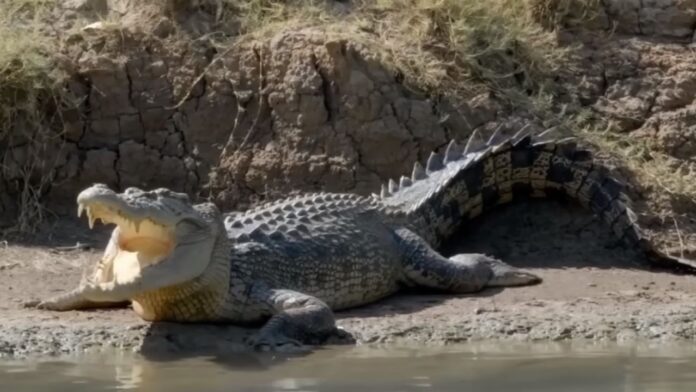Bangka Island, an Indonesian island rich in tin deposits, has seen a surge in crocodile attacks as illegal mining destroys the reptiles’ natural habitats. With their homes disappearing, crocodiles are being forced into populated areas, leading to deadly confrontations with humans.
Sariah’s Brush with Death Highlights Growing Danger
Sariah, a 54-year-old woman from Bangka Island, narrowly escaped death last September when a 3-meter-long crocodile attacked her as she was fetching water from an abandoned mining pit near her home.
“The water was calm and there was no sign of a crocodile, so I decided to take a bath,” Sariah recalled. “Suddenly, it appeared out of nowhere and bit me, dragging me by my left arm into the water.”
Read More: James Webb Telescope Detects Stunning Quartz Clouds
Sariah was lucky to survive the encounter with only injuries to her arm. But others on Bangka Island have not been so fortunate. In the past decade, crocodile attacks have claimed over 450 lives in Indonesia, with nearly 90 of those occurring on Bangka and neighboring Belitung Island.
Bangka Island: Rich in Tin, Stripped of Forests
Bangka Island, located off the southeastern coast of Sumatra, is one of the world’s richest sources of tin. About 80% of the island’s one million residents are employed in the lucrative mining industry. But the non-stop extraction of tin over decades has left its mark.
More than 60% of Bangka’s land has been converted into open-pit mines. Satellite images show the island pockmarked by massive craters – lunar-like scars across what was once pristine forest. With deposits on land dwindling, miners have turned to dredging the sea floor.
This wholesale destruction of Bangka’s forests has been devastating for its native wildlife, including the saltwater crocodile. The reptiles have been pushed out of their natural habitats as mines encroach further inland. Now, with nowhere left to go, crocodiles are making their homes in the abandoned pits and active mines near villages.
Ritual Killings Reflect Fear of Crocodiles
When a crocodile attack occurs on Bangka Island, the animal is typically killed rather than relocated. Many residents believe allowing a crocodile to live brings bad luck. Instead, they carry out rituals where the crocodiles are killed and buried near the attack site.
Conservationists argue against the ritual killings, trying to save captured crocodiles by bringing them to wildlife rescue centers like Alobi. But they face resistance from superstitious locals.
With no protected habitats left on Bangka, conservationists have limited options. Releasing crocodiles back into the wild would likely lead to more run-ins with people. Yet Alobi’s crocodile enclosure is already overcrowded, holding 34 rescued crocodiles in a space half the size of a tennis court.
Attacks Expected to Continue as Mines Expand
Experts agree that crocodile attacks will persist as long as illegal mining degrades and destroys crocodile habitats. As miners exhaust land deposits, they are moving operations offshore and into coastal areas. This forces crocodiles into increasing contact with humans, with deadly consequences.
In response, Indonesia has taken the controversial step of legalizing illegal mines. Miners can obtain licenses in exchange for vague promises of habitat restoration. But lax enforcement casts doubt on whether miners will follow through.
For Sariah, life near the mining pits remains dangerous. She refuses to fetch water there again after her near-fatal encounter. But with few other options, her family must continue to risk crocodile attacks for their basic needs.
“Sometimes when I sleep, the attack comes back to me in my dreams,” Sariah says. Unless crocodile habitats can be restored, the island’s residents will continue to live in fear of surprise attacks.
Read Also: Astronomers Spot Most Distant Fast Radio Burst Ever Detected



















![10 Countries With the Best Healthcare in the World [Statistical Analysis] Countries With the Best Healthcare in the World](https://articleify.com/wp-content/uploads/2025/07/Countries-With-the-Best-Healthcare-in-the-World-1-150x150.jpg)









